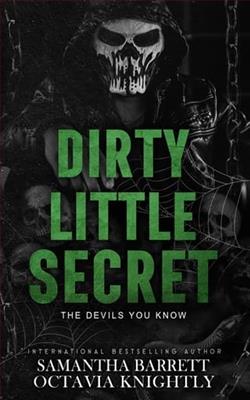Page 46 of The Cornish Princess
Something was troubling Gwendolyn, though she couldn’t put a finger to it yet.
Something.
All at once, from one of the distant smelting houses, came a shout, catching Gwendolyn’s attention. Together, she and Ely rushed forward to the balustrade rails to watch a lone man stumbling toward the palace. Behind him came more men carrying what appeared to be a rolled tarp. “What do you suppose this is about?” asked Ely.
Gwendolyn knit her brows. “I don’t know,” she said, her hand reaching for the heavy chain about her neck.
Caterwauling now, tripping over his own two feet, the first man rushed into the palace through the doors directly below, and Gwendolyn said, “Let’s go find out.”
ChapterSixteen
The First Alderman’s body had been discovered behind the smelting house.
Gwendolyn stood quietly aside the dais, listening to the account as it was described to her father, and even as she listened, three men unrolled a heavy tarpaulin before the dais, revealing the mauled body of what was supposed to be First Alderman Bryok.
The man was scarcely recognizable. And Gwendolyn should have recognized him. Only two mornings ago he had been alive and well, speaking at her father’s Konsel.
She grimaced. Apparently, during last night’s ceremony, the First Alderman had taken a blow to the head—substantial enough that he’d never recovered his senses. But then, perhaps because the gates were left wide open to allow celebrants to come and go as they pleased, wolves somehow discovered and mutilated his body.
But wolves? Really?
As to the weapon of his demise, a blood-stained forger’s hammer was found not more than an arm’s length from the body. The assailant hadn’t even concerned himself with the hiding of evidence, which Alderman Aelwin was quick to point out as he held the hammer aloft, bespoke the blacksmith’s innocence. Clearly, no man guilty of such a crime would ever leave his own tool, marked with his name, covered in blood, to be discovered so readily.
Anyway, the blacksmith and the First Alderman were not known to be acquainted. Or, at least, they were not connected in any way that seemed notable. Both ran in different circles—Bryok with his colleagues, and the blacksmith with his own kind, two different classes of men who rarely broke bread together, except during a celebration such as the one that was held last night. “The armorer’s hut is never locked. Perhaps the assailant only availed himself of what was near,” suggested Alderman Aelwin.
It was difficult to say much else about the man’s death, considering the state of his body. And, regardless, the physician tried.
Judging by the stiffness of his remains, Mester Ciarán said he believed Bryok encountered his assailant before the Promise Ceremony, or perhaps during, whilst everyone else was otherwise occupied. With a cloth wrapped about his hand, to protect himself from the ill humors that manifested after death, he bent to test the dead man’s arm, then the leg, if only to demonstrate his point. “Typically, this rigidity would appear between two and four bells after his death.” He released the Alderman’s leg, letting it drop with an awkward thud. “Once it appears, a man’s body can remain this way for hours, else days. I am afraid there can be no way to note when he died. You would do well to inquire with those who saw him last.”
“I spoke with him yesterday morn,” said her father’s steward.
Alderman Aelwin lifted a wiry brow. “Where?” he asked with interest.
Yestin rubbed hard at his bearded chin. “Here, in the hall, I suppose, whilst I was deciphering my ledgers. He begged permission to employ the kitchen, but I refused.”
Alderman Aelwin placed the hand with the hammer behind his back. “And why, I wonder?”
Yestin appeared confused. “Why did I tell him nay? Or why did he wish to employ my kitchen?”
“The latter, of course,” said Aelwin, waving his free hand as though to dismiss the question. “Naturally, everyone understands well enough why you wouldst say nay.”
“Ah, yes. Well, so he claimed, he wished for Alyss to brew a medicinal.”
Mester Ciarán tugged thoughtfully at his beard. “Oh? Was the First Alderman ill? I cannot recall he ever requested anything of me.”
“Not that I know,” said Yestin. “He seemed hale enough to me.”
The physician lifted a finger, as though only just recalling something. “But yes, well, I do recall him asking some moons ago whether I believed hemlock could have a use for mania. However, this was put to me as though he were inquiring for another.”
The King glowered. “What other?”
Mester Ciarán shrugged. “I’m afraid he did not say who, Majesty.”
Certainly her father would wonder, as Gwendolyn did, what business any man had to inquire about hemlock. It was a deadly poison, and unless it was used precisely by someone who knew every aspect of the plant and its use, it could do more harm than good.
Alyss was trained in simples, but to ask such a thing of her during such an eventful time, whilst the cook’s house was otherwise occupied, was unthinkable. Whatever pots she might use for the brew would be laced with poison and thereafter would need to be thoroughly scrubbed. It was a lot of work to be done when no time or hands could be spared. Even Gwendolyn’s normal dosing had been temporarily discontinued.
Certainly, she wasn’t an alchemist, but she knew enough to know what herbs to mix for what and where. As it was with a tincture of yew, there was little to be accomplished by its application, except death. Gwendolyn knew more than she liked to know about such things, because she’d been ingesting a special concoction of poisons in minute doses since she was only a child—a measure against treason, since poison all too often was a traitor’s weapon of choice. In fact, so did the rest of the royal family—including her mother—and this was why their cook’s house was sometimes employed to make such brews.















